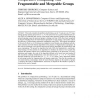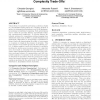5 search results - page 1 / 1 » Cooperative computing with fragmentable and mergeable groups |
119
click to vote
SIROCCO
2000
15 years 3 months ago
2000
ABSTRACT: This work considers the problem of performing a set of N tasks on a set of P cooperating message-passing processors (P N). The processors use a group communication servi...
107
click to vote
ICPR
2002
IEEE
16 years 2 months ago
2002
IEEE
A heretofore unsolved problem of great archaeological importance is the automatic assembly of pots made on a wheel from the hundreds (or thousands) of sherds found at an excavatio...
112
click to vote
SIMULATION
1998
15 years 1 months ago
1998
Setting up a simulation model is more than writing down state equations and running them on a computer. A lot of conceptual information about the physics and engineering aspects o...
148
click to vote
CVPR
2004
IEEE
16 years 3 months ago
2004
IEEE
We present a complete system for the purpose of automatically assembling 3D pots given 3D measurements of their fragments commonly called sherds. A Bayesian approach is formulated...
BIRTHDAY
2003
Springer
15 years 7 months ago
2003
Springer
The problem of cooperatively performing a collection of tasks in a decentralized setting where the computing medium is subject to adversarial perturbations is one of the fundament...


